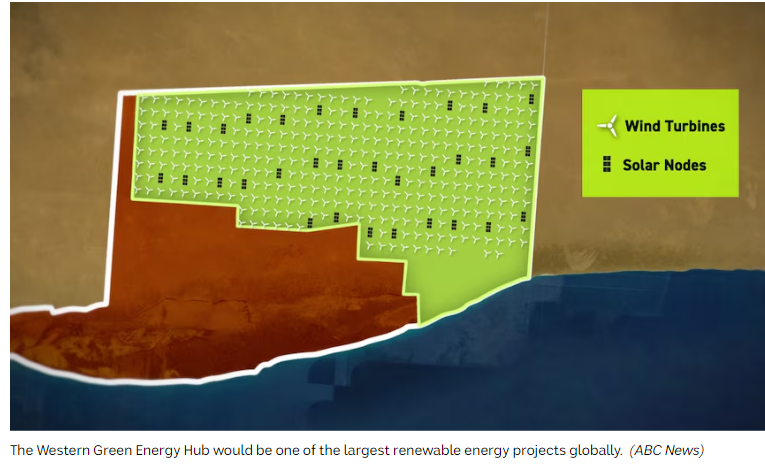Written by: Ned K. on 18 November2024
"Developers" Intercontinental Energy and CWP Global are planning one of the largest "green" hydrogen energy production hubs on the Nullarbor Plain north of Eucla. The project involves building a desalination plant, use of ground water in the Basin below the Nullarbor, 3,000 wind turbines and 60 million solar panels. The multinational corporations involved claim it will produce 3.5 million tonnes of "green" hydrogen a year for the Australian and international market.
According to The Weekend Australian of 16-17 November, the corporations involved in this proposal formed a "partnership" with Korea Electric Power Corporation, the largest South Korean electricity provider.
Venture capitalists Paris-headquartered Hy24, and Government of Singapore Investment Corporation GIC have together sunk equity investment totalling $US115 million ($180 million) into the project.
The project will involve hydrogen electrolysers, water and hydrogen pipelines, a new port and the clearing of over 27,000 hectares of Nullarbor Plain land.
The corporations involved claim 10% of the venture will be owned by the First Nations Mirning people who have native title rights to the area. InterContinental (46 per cent), CWP Global (44 per cent) account for the remaining 90% ownership.
Intercontinental Energy and CWP Global had previously begun a similar-sized green hydrogen project in the Pilbara, the Asian Renewable Energy Hub (AREH). In 2022, British multinational BP bought into the project and took over its operations, renaming it the Australian Renewable Energy Hub.
Scientists say that the project will be a disaster for the Nullabor Plain environment which includes extensive underground caves and unique fauna.
The corporations and WA Government of course say that "avoidance of impact" on environment and marine life is their highest priority!
The scientists say "The caves have preserved ancient underground landscapes, environmental histories and fauna that have remained frozen in time for hundreds of thousands and even millions of years".
The network of the cave system and groundwater system is so interconnected that scientists say that the project cannot avoid or mitigate harm to this environmentally fragile area.
In 1994 the area in question in a report to the UN found that the Nullarbor karsts met World Heritage criteria.
The message from the scientists is "go build your ‘green’ hydrogen hub somewhere else"!
In the hands of multinational corporations and their governments at state and federal level, "development" for profits come first, especially when they throw in the argument that projects like this one are renewable energy projects and not fossil fuel projects.
This puts traditional owners, the Mirning, in a difficult conflict-of-interest situation.
The Mirning are the traditional owners of the Nullarbor, and Mirning Green Energy, whch holds 10% equity in the project, is the commercial arm of the Mirning Traditional Lands Aboriginal Corporation (MTLAC).
In 2017 the Mirning People were granted native title over the land on which the developers now want to build, which means before any development can go ahead, an Indigenous Land Use Agreement must be negotiated.
"Our cave systems are our storylines," MTLAC chair Shilloh Peel said.
"Each family is connected to each cave, as well as the rock holes that provide water to the caves.
"We need to bring our people along with us … and we would have to make sure that all our cultural sites, heritage sites are protected."
However renewable energy projects are not much use to the struggle against capitalism's global warming crisis if the projects destroy the environment, including the cultural heritage of First Nations peoples.
What's the answer then?
As an interim demand, all renewable energy projects should be nationalised rather than in the hands of "developers" and only proceed by agreement with First Nations peoples.
Only an independent socialist Australia will maximize Australia's contribution to saving the planet.


No comments:
Post a Comment